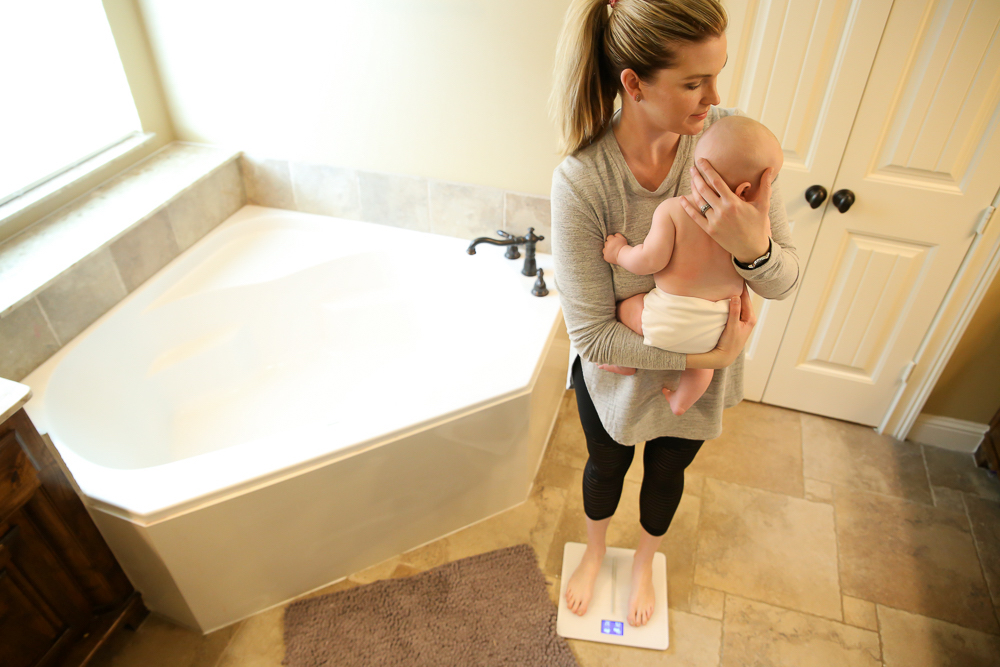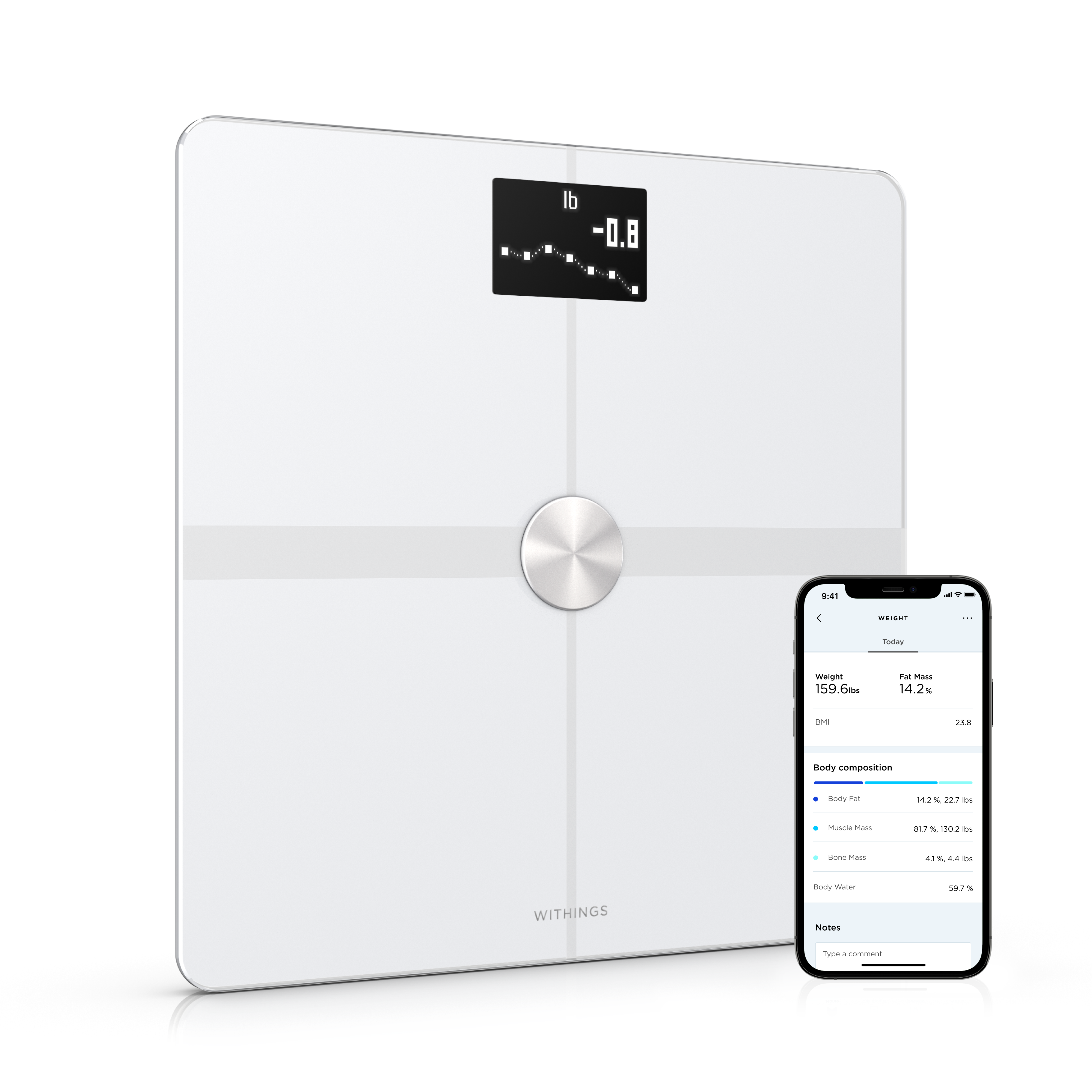
Even if it’s easy to answer the question “Should I weigh my baby?”, it’s tricky to answer the followup: “Why and how often?” Here’s what you need to know.
New parents may worry about their babies’ health. But when it comes to weight, what’s normal? What’s not? We’ll give you answers to some common questions and explain how to weigh your baby using a Withings scale.
How much should a baby weigh at birth?We know your baby’s first weigh-in will be remembered, shared and heavily commented on. But what are the facts?
- The average birth weight of a baby in Great Britain is 3.3kg (7.3 lbs).
- A weight between 2.5kg and 4.5kg (5.5 – 10 lbs) is also within healthy limits.
Why don’t all babies weigh the same?
Disparities in weight depend on 3 factors:
- The baby’s gender (girls usually weigh 300g less – 0.7 lbs – than boys)
- The parents’ DNA
- The health and nutrition of the mother during the pregnancy
Two other interesting factors: 1) Some of the genetic characteristics parents pass on to their children are specific to a certain region of the world. 2) A baby’s weight may be linked to its height.
Why weigh a baby?
Weighing newborns is important to monitoring their health — over time, the measurement shows you the rate at which they gain weight. And because babies can’t tell you how they feel, establishing a growth chart is one of the few objective ways to assess their health.
Why does a newborn baby lose weight?
You’d think that a baby would only weight, but this is not the case. There may be several reasons for a newborn baby’s weight loss:
- Babies are saturated with water, because they have been floating around in amniotic fluid (99% of which is water and electrolytes). Some of that water will eventually be eliminated.
- They must first “learn” how to digest milk, because they have been fed through the umbilical cord for 9 months.
As a result, newborn babies may lose up to 10% of their weight.
Why weigh a baby?
When babies are around 2 weeks old, they should have started to regain weight. It is not necessary to weigh them as often. A widely accepted notion is that a baby should be weighed around once a month. But if you have a smart scale, you can weigh your baby as many times as you please, as a way to monitor your child’s growth from the comfort of your own home.
Sometimes doctors ask that a newborn be weighed every week. This weekly rhythm may seem too much for some parents, especially if they don’t get enough information about what a baby’s normal weight is and why their baby should be weighed so often.
With a smart scale, you can easily check if your child’s growth chart is within a standard range, and if it follows a regular trend (no sudden weight gain/loss, no weight stagnation).
Should I worry?
Some parents may get over-stressed and start to see problems where there aren’t any. This is more likely to happen with first-time parents—as they become more “baby savvy,” they tend to become less anxious.
It’s perfectly normal to weigh your newborn baby several times—or even more—during their first year. Regular weigh-ins are a precautionary measure, as babies are vulnerable creatures. Variations in your baby’s weight may seem to be a problem, when, in fact, it is normal. If you have a question, it’s best to ask your pediatrician.
Nutritional choices and baby weight
Some experts have said that breastfeeding may prevent obesity in a child, and may also help the mother to lose pregnancy weight more quickly. Infants who are fed formula may gain weight faster than breast-fed babies. That said, some mothers may not be able to breastfeed.
Concerns about a baby’s weight may lead parents (and even certain health visitors) to question the feeding method they chose — whether it’s breastfeeding or bottle-formula feeding — and to believe they should switch to the other solution. In reality, you can’t blame a lack of weight only on the way you feed your baby — it is only one of the parameters.
What’s a healthy weight for a baby?
Several “standards” charts give us indications. Be aware that these charts show averages. They don’t form an undisputed reference. Babies have very different physiognomies — you can’t state that, for a particular age, a baby should weigh this or that.
When you consider a chart, you also have to consider how it was established to understand how to read it and to know if it even is relevant in your case. For example, the more official weight chart issued by the World Health Organization gives you an indication of the average weight of a baby that is breastfed for the first 6 months. Remember that there are other reasons to put this information into perspective, like the weight of the parents as explained above.
Once you know this, you can compare it to your child’s personal growth graph. Check that it is more or less in the right zone. If it’s not, or if your baby’s weight suddenly stagnates, decreases or increases, you should contact your doctor and mention it.
 Why weigh your baby at home?
Why weigh your baby at home?
Now that we can agree on the fact that it is preferable to monitor your baby’s weight, let’s consider the real hassle: too many appointments.
If you have a Withings smart scale at home, you can skip most of those: simply share your “homemade” weight measurements with your doctor by email, or by giving access to your baby’s Withings account. We recommend that you automate this sharing so that the doctor can act upon a problem immediately.
How can you weigh your baby?
With a Withings smart scale, it’s easy. In Baby Mode, all you need to do is step on the scale. For a more detailed how-to, check out “Introducing Baby Mode: A New Way to Weigh Your Baby.”



